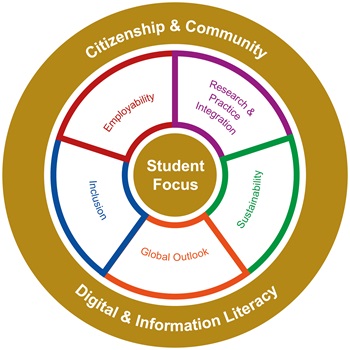Approach
We have made a commitment within our University Strategy to “combine the expertise and motivation of our community to enhance environmental sustainability within and beyond the University through our curriculum, research, operations, partnerships and engagement”. The commitment is further explained within our Environmental Sustainability Strategy alongside actions we have agreed to pursue between our 2024/25 and 2026/27 academic years.
Our work in this area is supported by the Environmental Sustainability Strategy Board of Governance (ESSBG) chaired by Prof Gary Hutchison, Assistant Principal (External Engagement). Two of the four ESSBG Workstreams further support our work. The Curriculum & Skills Workstream is led by Dr Amrit (Imi) Dencer-Brown and the Research, Innovation & Knowledge Exchange Workstream is led by Dr Gráinne Barkess.
Curriculum and skills
In addition to our University Strategy, our Learning & Teaching Strategy (2020 – 2025), which reports to the Learning, Teaching & Assessment and Student Experience Committee, includes a significant focus on education for sustainability development. This is through our taught undergraduate and postgraduate provision and through our academic themes and connections with research and professional practice.
Indeed, sustainability is one of five key themes in our ENhance Curriculum Framework. Establishing and embedding the Framework is a key transformational action within the University Strategy. We measure our overall education for sustainable development success through our Curriculum Framework and our United Nations Sustainable Development Goals (UNSDGs) focus.
To support all academic colleagues review and embed environmental sustainability opportunities, an ENhance Sustainability Quick Guide has been developed.
Examples of our academic work in this area include:
Achieving Sustainability module
Launched during our 2021/22 academic year, the module was developed by academic colleagues representing five of our six Schools. The key learning outcomes of the module are to “identify and plan creative practical actions to promote sustainability and show how these relate to one or more of the key ideas of sustainability that are discussed in the module” and “collaborate to deliver a practical outcome designed to promote sustainability and evaluate its potential for impact”.
More information available within our module directory.
‘Teaching and researching for a just transition’ conference
In May 2025, Edinburgh Napier joined five other institutions based in the UK and Europe as the Scottish ‘hub’ for a sharing of practice in sustainability in teaching and research. Our contributions included a lightning talk with colleagues at four of our Schools on the work undertaken in the specialisms, from nursing to business and literature. The conference was well received, with over 200 delegates online and attendance in person at our Craiglockhart campus by students and staff representing three Scottish institutions, including the Edinburgh Napier Sustainability Society.
Find out more about the conference.
Build for Purpose
The Business School have developed a free Build for Purpose online course. The course explores how business of all shapes and sizes can build their purpose, transition to a net zero economy and accelerate action towards the United Nations Sustainable Development Goals (UNSDGs).
Living laboratory
There are many living laboratory examples within the university, one being the SDG5 Living Lab developed by Bright Red Triangle.
Wider examples
There many academic best practice examples throughout Schools, Services and teams such as the Transport Research Institute and Institute for Sustainable Construction. The Centre for Timber Engineering was awarded the Queen’s Anniversary Prize in 2015 for internationally acclaimed work in timber engineering, sustainable construction and wood science.
Research, innovation and knowledge exchange
Our environmental sustainability focus is also clear throughout our Research & Innovation Strategy (2020 – 2025), which reports to our Research & Innovation Committee. The primary aim of the Strategy is to “foster a sustainable and interdisciplinary research environment that inspires and brings together our academic staff, researchers, students and external stakeholders, to solve real world problems as well as influence professional practice and policy nationally and internationally, driving key societal, economic and environmental impacts.”
Examples of our academic work in this area include:
United Nations Sustainable Development Goals (UNSDGs)
ESSBG members have been instrumental in reviewing existing UNSDG embedment within all research activity. Through developing and running keyword searches within all published documentation, significant insight has been gained. As a result, linked to the ENhance Sustainability Quick Guide, guidance is being developed to support all research colleagues to increase UNSDG knowledge. This includes directly embedding and referring to applicable UNSDGs within all research activity recorded through WorkTribe (the research monitoring tool used by the university).
Scotland Beyond Net Zero
To further develop collaborative research and funding opportunities, the University is a member of the Scotland Beyond Net Zero network.